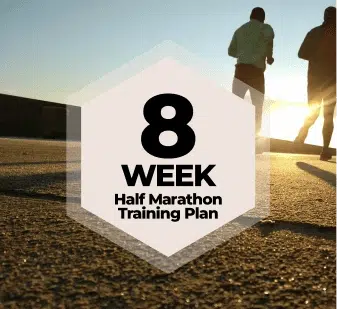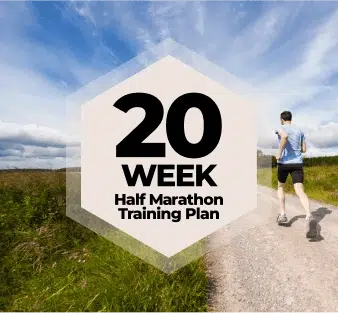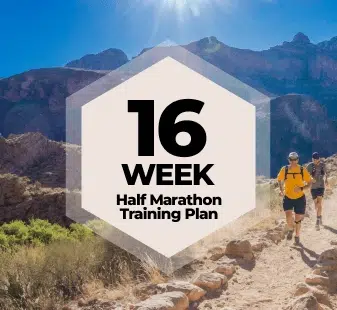Sometimes you sign up for a race that’s not far off in the future – say, two months away. If you’ve been running somewhat regularly already, you now need to ramp up your training. But it’s definitely do-able: Our eight week half marathon training plan will get you ready to run 13.1 miles in two months.
Becky Wade Firth, a pro-marathoner, cross-country running coach, and HMG writer says this eight week plan is designed for runners who already:
- Run at least three days per week
- Already do a long run of at least 4 miles
We know that doesn’t apply to everyone, but to safely build up to the half marathon distance in two months, your body needs foundational conditioning to avoid injuries and, generally, avoid an enjoyable experience, Firth says.
(If you are a complete beginner or aren’t currently logging three runs a week, you can still complete a half marathon eight weeks from now – but we’d highly recommend you follow our run-walk training plan.)
To train in eight weeks, follow the below training plan to a tee. Think of your shorter, mid-week runs as opportunities build up your speed and your longer weekend runs to build up your endurance, Firth advises.
If you want help with your training, we recommend also downloading an app like Runna. With plans constructed by Olympic athletes, you’re bound to make it a run to remember. Use code HALF for 2 weeks of free training.
8-Week Half Marathon Training Plan
For a Saturday Race
| Week | Monday | Tuesday | Wednesday | Thursday | Friday | Saturday | Sunday |
| 1 | Off | 3 miles | 4 miles | 3 miles | Off | 5 miles | 2-3 miles |
| 2 | Off | 3 miles | 4 miles | 3 miles | Off | 6 miles | 2-3 miles |
| 3 | Off | 4 miles | 5 miles | 4 miles | Off | 7 miles | 3 miles |
| 4 | Off | 4 miles | 5 miles | 4 miles | Off | 8 miles | 3 miles |
| 5 | Off | 5 miles | 6 miles | 5 miles | Off | 9 miles | 3 miles |
| 6 | Off | 5 miles | 6 miles | 5 miles | Off | 10 miles | 3 miles |
| 7 | Off | 4 miles | 5 miles | 4 miles | Off | 11 miles | 2 miles |
| 8 | Off | 3-4 miles | 4 miles | 3-4 miles | Off | 13.1 miles | Off |
For a Sunday Race
| Week | Monday | Tuesday | Wednesday | Thursday | Friday | Saturday | Sunday |
| 1 | Off | 3 miles | 4 miles | 3 miles | Off | 2-3 miles | 5 miles |
| 2 | Off | 3 miles | 4 miles | 3 miles | Off | 2-3 miles | 6 miles |
| 3 | Off | 4 miles | 5 miles | 4 miles | Off | 3 miles | 7 miles |
| 4 | Off | 4 miles | 5 miles | 4 miles | Off | 3 miles | 8 miles |
| 5 | Off | 5 miles | 6 miles | 5 miles | Off | 3 miles | 9 miles |
| 6 | Off | 5 miles | 6 miles | 5 miles | Off | 3 miles | 10 miles |
| 7 | Off | 4 miles | 5 miles | 4 miles | Off | 2 miles | 11 miles |
| 8 | Off | 3-4 miles | 4 miles | 3-4 miles | Off | 1-2 miles | 13.1 miles |
About This Training Schedule
Who It’s For
This plan is designed for beginner to intermediate runners who have limited time to prepare for a half marathon. You should already be running a few days each week so you’ve built up your leg, lower body, and cardiovascular strength, Firth says. This will help you be able to handle the number of miles you’ll be running throughout the training.
While inexperienced runners may be fine running a half marathon in two months, best case, you’ll have run a few shorter races such as 5Ks and 10Ks before starting this plan, she adds.
Injury Prevention
While this training plan is designed to help you increase your mileage safely, overuse injuries like runner’s knee and plantar fasciitis do happen – especially if you increase your mileage too quickly, Firth advises. That’s why it’s really important that you don’t try and go from couch to half marathon in eight weeks.
A reliable adage to minimizing injury is to not increase your mileage by more than 10% of the previous week’s volume. That means you should already be running 4 miles regularly to train for a half in 8 weeks.
Otherwise, be sure to:
- Cross-train at least one non-run day per week. This can be anything from spinning to swimming, which will provide cardiovascular benefits without the pounding impact that running can cause. If you’re prone to injury, you can swap out another shorter run each week with a cross-training session of the same duration.
- Rest, even when it feels wrong. It’s tempting to pack in more runs when you’re short on time, but resting is vital for recovery and better performance. If you crave activity on rest days, try a gentle walk, light cross-training, or flexibility work.
- Commit to strength training. It’s a game-changer for runners, adding power and endurance while reducing the risk of injury. Try to plan it on the heels of a longer or harder run (later that day or the next day) so you aren’t overly fatigued going into key sessions. While two 30 minute sessions per week is the goal, even just one will make a difference. Definitely prioritize a balance of rest and training; adding strength sessions to a condensed build like 8 weeks might be too much for some runners to handle, energy- and time-wise
What to Eat
Fueling is crucial for maintaining energy, boosting performance, and accelerating recovery – especially during an 8-week half marathon training plan. The best half marathon nutrition consists of meals with:
- 50% carbs to supply immediate energy
- 25% protein to aid in muscle repair
- 25% fats to provide sustained energy
For daily nutrition, focus on complex carbs like whole grains and starchy veggies, plus lean proteins and healthy fats. For shorter runs (under 60 minutes), your normal diet should meet your needs, but for longer runs (over 60 minutes), increase carbs the day before to build up glycogen stores.
During runs longer than an hour, re-fuel mid-run to maintain energy, taking in 30-60 grams of carbs per hour from gels, chews, or sports drinks.
Post-run, consume a 4:1 carb-to-protein ratio (like a smoothie with protein powder) within 30 minutes to aid recovery and replenish glycogen for your next workout. Then try to get a substantial meal within an hour or two after that.
More Half Marathon Training Plans
9 Weeks • 10 Weeks • 12 Weeks • 14 Weeks • 16 Weeks • 18 Weeks • 20 Weeks
–
We independently produce all the content associated with the training plans we feature on HalfMarathons.net. If you buy or sign up for services through the links on our site, we may receive an affiliate commission – which in turn supports our work.





